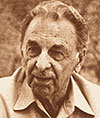JRD''s legacy
By In his later years, the | 28 Jul 2004
JRD commands a standing ovation even today. Uday Chatterjee reports In his later years, the only childhood incident JRD Tata remembered is the sound trashing from his father when he was four. That was for being rude to his aayah . Since then, nobody ever remembers JRD being rude. He was supposed to posses a quick temper. But rude? Never!
In his later years, the only childhood incident JRD Tata remembered is the sound trashing from his father when he was four. That was for being rude to his aayah . Since then, nobody ever remembers JRD being rude. He was supposed to posses a quick temper. But rude? Never!
This rare, genteel quality rubbed off on his colleagues and is the brand, which makes the Tata group of companies, tower over others. This is also the legacy which JRD — today he would have been 100 — spread.
Born in Paris to RD Tata, a business partner and relative of Jamshetji Tata, and his French wife Sooni , JRD spent his formative years mainly in France and went to school in France, Japan and India. He was then drafted into the French army for the mandatory year-long stint. He wanted to extend his army service so that he could attend a renowned horse riding school but his father would have none of it. Call it destiny or whatever, shortly thereafter the entire regiment he served in was wiped out while on an expedition in Morocco.
JRD then was keen on studying engineering at Cambridge but his father summoned him to India to serve with the Tatas. JRD therefore never went to college, which was the major regret of his life.
JRD joined the Tatas as an unpaid apprentice in December 1925. At 22, soon after his father passed away, JRD joined the board of Tata Sons, the group's flagship company. In 1929, aged 25, he surrendered his French citizenship to become a 'compleat' Indian.
Since childhood, JRD had a fascination for flying, which led him to set up Tata Aviation Service, an airmail service that would connect Bombay, Ahmedabad and Karachi. This company later became Tata Airlines and in 1953, morphed into Air India, a nationalised carrier. Jawaharlal Nehru, a good friend — though they never agreed on politics — let JRD continue to head Air India without government interferance.
 An interesting feature of JRD's executive style was that he spent his working hours with the Tata companies in a partially hands off, non-executive style while his time with Air India was spent in a totally hands-on style. He spent half his working hours with Air India while the other half was allotted for the various and diverse Tata companies. And while at the Air India office, he would breathe, eat, drink and sleep Air India.
An interesting feature of JRD's executive style was that he spent his working hours with the Tata companies in a partially hands off, non-executive style while his time with Air India was spent in a totally hands-on style. He spent half his working hours with Air India while the other half was allotted for the various and diverse Tata companies. And while at the Air India office, he would breathe, eat, drink and sleep Air India.
In 1978, JRD was unceremoniously removed from Air India by the then characteristically boorish prime minister, Morarjee Desai. This hurt JRD no end and though he was reinstated subsequently by Indira Gandhi, his heart was no longer in it. His removal from Air India is a sleight JRD could never overcome.
JRD became the chairman of Tata Sons in 1938. Over the next 50 odd years the Tata group expanded into chemicals, automobiles, tea and information technology. Breaking with the Indian business practice of having members of one's own family run different operations, JRD pushed to bring in professionals. He turned the Tata Group into a business federation where entrepreneurial talent and expertise were encouraged to flower.
Handling Air India and the Tata group of companies were a task in themself but that did not detract JRD from taking up and excelling in other activities. He played a critical role in increasing India's scientific, medical and cultural development. The Tata Institute of Fundamental Research, Tata Memorial Hospital, Tata Institute of Social Sciences, the National Institute of Advanced Sciences and National Centre for the Performing Arts were projects that would not have seen the light of day but for his JRD's steadfast, lifelong support.
Though JRD was strictly not for charity per se, he played his part by setting up in 1944, the multipurpose JRD Trust. A few years later he sold more of his shares and an apartment in Bombay to establish the JRD and Thelma Tata Trust, which works to improve the lot of India's disadvantaged women.
Another pet theme with JRD was India's "desperate race between population and production." Here, too, he disagreed with Nehru's thought "population is our strength." JRD devoted considerable thought on what can be done to stem the country's population growth. To this end, he helped start the International Institute of Population Studies. In 1992, he received the United Nations Population Award.
JRD was a shy and reticent man. He never hankered after honours,which were showered on him in abundance. On being told that the Indian government was thinking of giving him the Bharat Ratna, the country's highest civilian award, he is reported to have said: "Why me? I don't deserve it. The Bharat Ratna is usually given to people who are dead or it is given to politicians. I am not prepared to oblige the government on the former and I am not the latter."


















